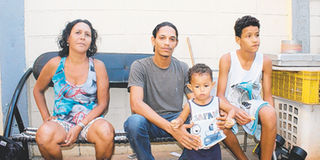If evictions were an Olympic event, Brazil would win gold

Sonia and Raphael were removed from their favela in 2010. PHOTO | IRIN
What you need to know:
- Between 2009, when Brazil won the right to host the world’s biggest sporting extravaganza, and 2015, 22,059 Rio families were resettled for a number of reasons, according to official figures.
On Saturday night, as a predicted global audience of 900 million tunes in for all the razzmatazz of the opening ceremony, spare a thought for the many residents of Rio de Janeiro who have had their homes taken from them to make way for the Olympic Games, an event that lasts just 17 days.
Between 2009, when Brazil won the right to host the world’s biggest sporting extravaganza, and 2015, 22,059 Rio families were resettled for a number of reasons, according to official figures.
The number or evictions directly or indirectly linked to the Olympics remains contested.
In an email to IRIN, Rio de Janeiro city hall said: “In the city’s preparation for the Olympics, the only community affected by works related to sports facilities was the Vila Autódromo, nearby the Olympic Park.”
Vila Autódromo, a favela that had been home to some 900 families, was almost entirely demolished to make room for Barra Olympic Park, a cluster of nine sporting arenas where much of the action will take place. After a long and brutal eviction process, 20 families were able to remain on site, with new houses built for them.
The official number of evictions that took place for works directly or indirectly related to the Olympics is contested by human rights and advocacy groups, who estimate that more like 2,500 families were forced out.
The situation is not black and white. Some families, arguably, have benefited from being placed in newly built public housing blocks. And all those resettled either received new lodgings or at least some financial compensation.
But human rights defenders and advocacy groups maintain that this doesn’t justify top-down removals that they argue serve mostly to benefit the city’s real estate market.
Here’s a look at how life has changed dramatically for some residents:
Raphael Richard, 26, and his mother Sonia Braga, 53, lived in a favela in Recreio dos Bandeirantes – a fast-developing beach neighbourhood – and were removed in 2010 along with some 194 other families.
They were relocated to a public housing unit in Campo Grande, more than an hour away from their old home, on the far western edge of Rio de Janeiro.
The settlement is located away from infrastructure and commerce in the region. The approach is semi-rural and is littered with huge volumes of dumped rubbish.
Raphael and Sonia were removed when city hall said they needed to make way for a rapid bus transit lane, one of the key transport legacies associated with the Olympics. Until now, however, nothing has been done in the space where the community sat.
“It’s like they removed us just for the sake of it,” says Raphael.
Raphael and Sonia both say they preferred living at their old house “1,000 times more”. Ideally, they would sell the house and move back to Recreio, but they haven’t received the final proof of ownership documents yet from city hall.
Raphael complains that transport options in the region are poor. There is only one bus, he says. It also only starts at 5am and sometimes he needs to leave earlier.
A painter who does informal jobs, Raphael used to be closer to the rich neighbourhoods where the better work was. Now, he faces longer commutes or has to accept lower local wages closer to his new abode.
Sonia, who has high blood pressure, complains about the long journey to see doctors. “If I get sick, I will die here,” she says.
The settlement and most of the area around it are also dominated by organised crime groups known as “militias”. These are typically made up of corrupt former and serving police officers who act as informal security in the absence of the state.
The groups are known to force residents and businesses to pay special “taxes”, and enforce their own laws and justice through violence. The Brazilian press has reported several cases of abuse in the settlement and “expulsions” for breaking the rules.
The writer filed this article for IRIN from Rio de Janeiro




